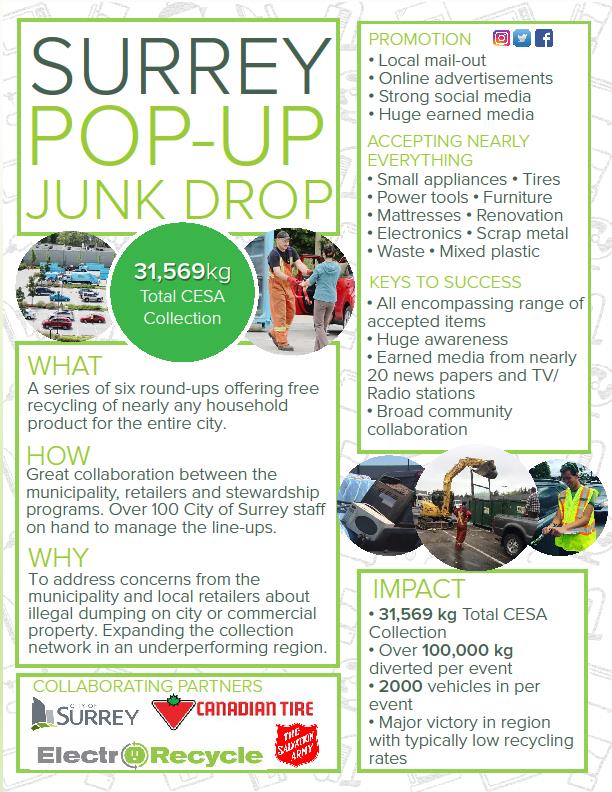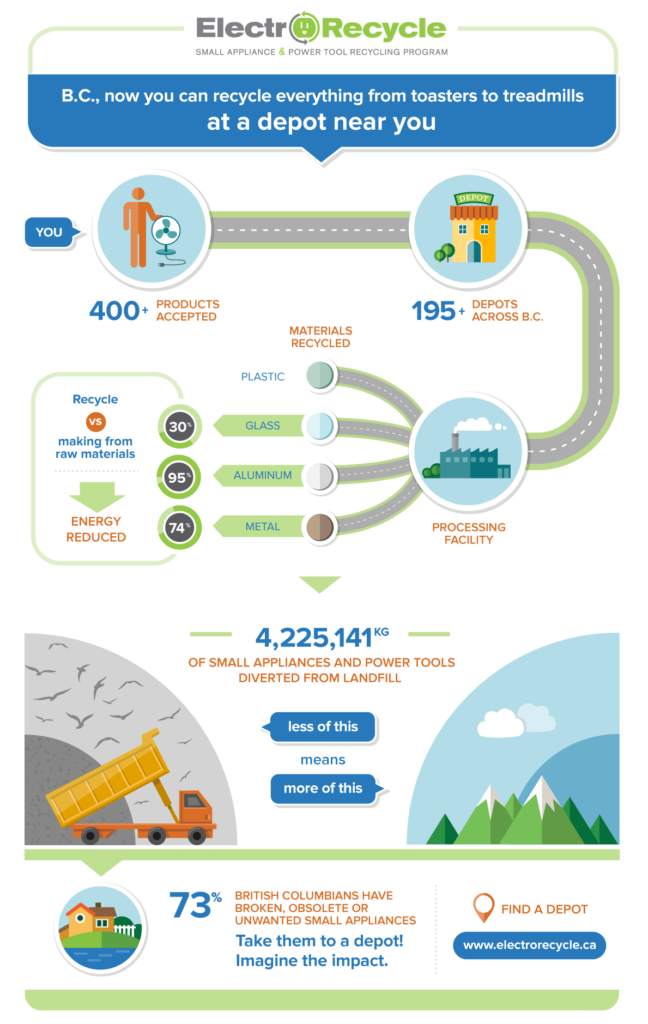CESA’s Mandate: to assist manufacturers, brand owners and other legally obligated parties in discharging their obligation to provide end-of-life recycling solutions under applicable provincial extended producer responsibility (EPR) legislation.
About Canadian Electrical Stewardship Association:
The Canadian Electrical Stewardship Association (CESA) is a federally-incorporated, not-for-profit organization that is led by the very industry whose products are stipulated in the ever-expanding EPR regulations around electrical equipment in Canada. Members of the small household appliance industry came together in 2011 when the BC Ministry of Environment expanded regulations to include small household electrical appliances and then in 2012, added power-tools, exercise equipment and crafting machines.
CESA was incorporated as a national entity with the foresight and understanding that our membership consists of large multi-national and national manufacturers and retailers of small appliances and power tools who are seeking a harmonized and national strategy to managing their EPR obligations. As regulations expand across Canada, it is the desire of CESA’s membership to reduce costs, achieve economies of scale and most importantly harmonize wherever possible with existing programs. It is imperative to CESA’s members that as manufacturers and retailers of products that have a dramatically different life-cycle than electronics, that a unique and stand-alone program be allowed.
CESA currently provides residents of BC easy access to recycle more than 400 products across the province at depots, municipal transfer sites, regular and convenient round-up collection events and participating retailers. The Environmental Handling Fees (EHFs) are collected at point-of-sale, and CESA’s members report and remit on a monthly basis. The EHFs cover collection, transportation and recycling of electrical products, as well as marketing efforts to ensure British Columbians are aware of an environmentally-responsible and convenient way of disposing of their old electrical small appliances and tools.
CESA has produced audited financial statements and annual reports since 2011. The latest reports and financial statements (2013-2015) can be found on our website: https://www.electrorecycle.ca/stewards/resources/
Introduction
The Canadian Electrical Stewardship Association (CESA) is pleased to respond to the Strategy for a Waste-free Ontario. Since 2011, CESA has worked with the Government of British Columbia, industry, municipalities, not-for-profits and the public to divert small appliances and power tools away from British Columbia landfills. In that time, we have raised the awareness of our small appliance diversion program from zero to 79.3%. Tens of thousands of tons of small appliances have been diverted away from BC landfills.
We bring that experience to the table with an eye to helping the government move closer to the goal of a circular economy and a waste-free Ontario. We contend that to get close to that goal, each waste stream will require a dedicated strategy, an engaged industry association and motivated stakeholders.
In short, it requires focus and intentionality, an approach that CESA knows well and that has shaped the following response to the Strategy for a Waste-free Ontario.
Objective 1: Enhance Provincial Direction and Oversight
To be effective, industry-led diversion and recycling programs require clear, consistent provincial government direction via legislation, regulations, policy directives and regular discussions with stakeholders.
The industry expects to be measured against performance benchmarks, which will depend on data. CESA’s experience in British Columbia involves working with the government to determine appropriate methods and practices for identifying recovery statistics that are specific and relevant to the program. Consumption/purchase habits, frequency and type, are relevant to each program and data collection is integral to understanding the programs as they are proposed for expansion.
One size does not fit all when it comes to data and its interpretation, and CESA encourages the government to take the time to understand the nuances of each program and the product life-cycles before assigning targets and recovery rates that are not founded in consumer habit and product life-cycles.
CESA would be pleased to work with the Resource Productivity and Recovery Authority by helping to collect relevant data from obligated stewards for the proposed registry, and to provide input on the new producer responsibility regime.
Under Action 2 the Strategy identifies several economic, environmental, education and efficiency objectives, all of which align with the CESA mandate. As such we would welcome Ministerial policy statements that provide greater clarity and detail. Where there are differences between the direction proposed and CESA’s position, we would propose a respectful discussion designed to advance the interests of both parties. We note the Strategy commitment to developing policy statements based on consultation, evidence and collaboration, a position we support.
In the Action 3 section the discussion returns to data collection and performance metrics. CESA has experience with data collection and performance metrics through our work in British Columbia. We have attached our annual report to give you a sense of our reporting requirements and performance metrics. While data collection in BC is improving, challenges remain. As recently as 2015, all industry-led organizations were held to new, stricter requirements for annual reporting and the expectation that assurance-level auditing would be performed. This experience has strengthened our annual reports to both the government and to stakeholders.
For instance, we can say with a high degree of accuracy the number of small appliances being purchased every year in British Columbia through bricks and mortar retailers. Online sales (e-tailers) continues to be a challenge faced by all EPR programs. But for performance metrics, CESA strongly encourages the government to have open discussions with each product category/industry-led program, to determine the most logical and meaningful metrics specific to any given program. Performance metrics are not a one-size fits all. For example, within a small appliance program, recovery rates are not appropriate measures of a successful program. Sales are reported in units, whereas depots report total weight collected. This makes a recovery rate impossible to calculate. And if prompted for product weight information, retailers and manufacturers will be quick to point out the information is not readily available. Product weights are not exclusive of packaging, as the shipment and display weights are the critical pieces of data used within the supply chain. Leakage across provincial boundaries and secondary markets and reuse, complicate recovery rate discussions further.
Because of our product specific knowledge, relating to sales, product life-cycles and consumer behaviours, we believe our experience could be of value as the province consults on ways to collect and assess the data. CESA cautions however, that the data must be treated confidentially, as sales data is confidential to each and every member, as is any information related to their upstream supply channels or downstream distributions.
Objective 2: Enable Efficient and Effective Recovery Systems
CESA supports the new producer responsibility framework envisioned in the Strategy (Action 4). In many respects, it is why CESA exists. Our member companies formed CESA precisely because they identified that collecting, and recycling small appliances, and building public awareness, required a dedicated and intentional strategy. When small appliances are included with other waste streams, the result is predictable. The largest members of the group dominate the attention, the agenda, and the decision making, and small appliances get ignored, meaning more of them end up in landfills. CESA believes that the small appliance program, whenever introduced, needs to be a stand-alone program, outside of existing waste diversion programs dedicated to electronics.
Since forming our own organization, and winning the support of the government, we have played a major role in diverting small appliances back into the economy and away from BC landfills.
“As a long-standing member of CESA, we are confident that the small appliance category is sufficiently unique that it would be best represented by a stand-alone program that is individual and intentional in its strategy and execution.“
Rob Felix
Vice President, General Merchandise, Insurance Services, Warranty & Postal Outlets
London Drugs Ltd.
“Dyson has been a member of CESA since its inception in 2011 in BC. We are impressed with the organization’s ability to drive collection volumes higher every year, increasing awareness through partnerships in urban, rural and remote communities, all the while successfully representing smaller manufacturers whose voice would otherwise have been lost if amalgamated into larger WEEE programs.
Dyson wholly supports CESA’s efforts to introduce their successful model into Ontario, and looks forward to partnerships with Ontario’s government in developing sustainable solutions for long-term growth in tandem with environmental management.“
Andrew Robinson
President
Dyson Canada
Action 8 affirms “public participation in resource recovery”, a concept that CESA fully subscribes to. Education and public participation is a major objective of our work in British Columbia and a central plank in the CESA mandate. It’s central to what we do. Below is an example of our work in Surrey, which helped educate and raise awareness while also diverting thousands of small appliances from landfills.

Objective 3: Increase Waste Reduction and Improve Resource Productivity
Under Action 9 the Strategy notes that the Resource Recovery and Circular Economy Act 2016 will designate new materials via regulations, and among the first to be designated are appliances, electrical tools and batteries. CESA has a five-year record of success in waste diversion in British Columbia. We have helped keep tens of thousands of small appliances out of landfills, turning them back to the economy instead.
It is our belief that zero waste is a challenge at any time, but especially so if waste streams are categorized too broadly, suggesting that, for instance, the strategy for recycling big screen TVs should be the same as the strategy for recycling electric toothbrushes.
Furthermore, provincial governments have committed to seek out harmonization as a primary objective when expanding EPR programs. Given that batteries, electrical tools and appliances have been identified for designation (Page 28) CESA stands ready to serve as the responsible industry organization for ensuring these products get recycled back into the Ontario economy.
CESA offers two keywords of caution when identifying new product categories for inclusion in expanded EPR regulations: collect the data first, and allow sufficient time to introduce new programs. Many provinces, including Ontario, have learned that a program will meet with much greater success if duly planned and executed, rather than put in with haste. There is still much data to collect to determine if small appliances should indeed be an early program introduction. With a desire to reduce waste headed to landfill, the government would benefit greatly from landfill studies to help them to develop a prioritized list of products for designation based on hazard assessments and volumes currently directed to landfill.
Once the data and research clearly shows that the time is right for expanded electrical stewardship in Ontario, CESA stands fully prepared to serve as the industry lead on small appliances and power tools.
CESA’s members come from across Ontario and constitute a major stakeholder for the government and the Authority. The below map illustrates the Ontario head office locations of CESA’s members. However, what it doesn’t show is that virtually every small town greater than 10,000 people, will have multiple retail store fronts representing every category of CESA product for sale in Ontario.

Objective 4: Create Conditions for Sustainable End-Markets
In the section under Action 15 the Strategy discusses disposal bans. CESA supports disposal bans in principal and would be pleased to take part in consultations. While data suggests that disposal bans can be one of several effective tools in reducing designated wastes in landfills, CESA encourages the government to take the time to properly introduce the ban after a successful program launch and measureable program uptake. It is critical to allow time for all of the promotion and education materials to be in market before and during launch, and to have a fully operational EPR program for small appliances for a minimum of one year before implementing any landfill bans. This will help garner greater success for the program and less compliance efforts at the end-fate stage, reducing overall costs.
Coordination, Collaboration, and Implementation
CESA is pleased with the MOECC’s commitment to ensuring stakeholder feedback is included to help build and strengthen Ontario’s desire to drive towards a zero-waste and circular economy. We look forward to participation at all stages of the regulatory process.
CESA notes that the addition of small appliances as a new product category is tentatively planned for the short-term time-frame, being 2017-2018. CESA believes that, in the absence of supporting data to suggest small appliances are a high priority item, that this is an aggressive timeline. Perhaps data will confirm the need to launch a new program for small appliances in the near term, but failing that, CESA would appreciate the opportunity to have continued dialogue as the category of small appliances and power tools nears a greater likelihood of implementation.
Summary
CESA is a strong supporter of harmonized, cost-effective strategies that help our members discharge their obligations under provincial EPR programs. Our members are seeking individual representation by the collective of their choice, and not to have their products designated into an existing program, thereby eliminating their free choice of how best to manage their obligations. We are confident that our success in BC can be modeled in Ontario and where necessary, adapted to the regulatory and organizational landscape within Ontario. The below graphic, with data from 2015, illustrates our position clearly.
Thank you for the opportunity to present CESA’s members thoughts on the Waste-free Ontario Strategy.

